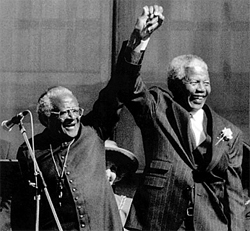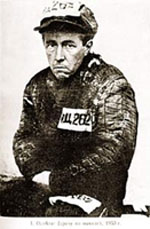Back in the early 1960s, black South African lawyer and activist Oliver Tambo was asked to describe a colleague who had just gone to prison for resisting white minority rule in that country. He replied that this man is “passionate, emotional, sensitive, quickly stung to bitterness and retaliation by insult and patronage.” Tambo was talking about his law-firm partner, Nelson Mandela—remembered today for his grace, humor, and empathy, as well as his remarkable courage and leadership.
What happened to Mandela in prison, what changed him so radically, is still a bit of mystery in my mind. He was often asked about a slice of this question—how he let go of the anger he felt specifically toward whites—and his responses were usually of a fairly standard therapeutic variety. Bill Clinton, in an interview aired last night by CBS Evening News, related one such exchange with Mandela.
I said, “Now, Mandela, you’re a great man but you’re a wily politician. It was good politics to put your jailers in your inauguration and put the heads of the parties that imprisoned you in your government. But tell me the truth, when you were walking to freedom the last time, didn’t you hate ’em?” He said, “Yes. Briefly I did. I hated them and I was afraid. I hadn’t been free in so long. And then I realized if I still hated them after I left, they would still have me. I wanted to be free. And so I let it go.” He said, “That’s what you have to do. That’s what we all have to do. We have to let it go.” I mean, that’s the kind of thing he would say to me just in ordinary conversation.
“They would still have me.” How true. But does this explain the difference between the petulant man sized up by Oliver Tambo, circa 1963, and the Nelson Mandela we came to know and revere? Former Time managing editor Richard Stengel, author of Mandela’s Way: Fifteen Lessons on Life, Love, and Courage, has offered some further insight into Mandela’s personal transformation during his 27 years locked up in a tiny cell. Asked in an interview if prison was one of Mandela’s great teachers, he said:
Yes. Because prison changed that young man, and it burned away a lot of the extraneous parts of his character. And again, part of it was through his own self-analysis, but part of it is through this imposed control that prison has on you. I mean, the only thing you could control when you were in prison for all those years was yourself.
I mean, I remember when I first went to his cell in Robben Island. And I walked in, I walked—nearly walked in, but I gasped when I saw it, because—I mean, Nelson Mandela, as you know, is a big man. He’s 6’2″ inches tall, he has big hands and a big head. And he is larger than life in a literally and figurative way.
And this prison cell—I mean, he couldn’t even lie down and stretch out his legs. I mean, it could barely contain him. But what he learned and what he taught himself was how to contain himself, how to practice the self control that he actually didn’t have before he went into prison.
I don’t know if even this explains how someone becomes a strikingly different human being, although prison has been known to bring about extraordinary changes in people. What’s clear is that Mandela left prison with forgiveness in his heart—but there’s no getting around the politics.
Mandela’s Politics of Forgiveness
Mandela understood the difference between personal forgiveness and forgiveness in politics. In one of many symbolic and deeply personal gestures, he made his white jailer an honored guest at his presidential inauguration in 1994. But he knew that something else was needed in dealing with the larger ranks of white South Africans (often in the police and military) who had committed terrible human-rights violations. Mandela did not, as is widely believed, simply let those people go free, unconditionally. They had to do something in return for political amnesty. And that something was enshrined in the post-apartheid Truth and Reconciliation Commission that he set up with Anglican Archbishop Desmond Tutu as its chairman.
Human-rights abusers had to go before this tribunal, whose proceedings were televised, and tell the whole truth about their atrocities. They had to reveal, in some cases literally, where the bodies were buried, and they did so often in grisly detail. Or else, they faced criminal prosecution.
This is not garden-variety forgiveness. It is not a single, unconditional act of letting bygones be bygones. Political forgiveness is different. It is a process, usually a negotiated one. It calls for truth and acknowledgment, if not necessarily repentance, and there are trade-offs and conditions. Without the conditionality, forgiveness loses a vital link to justice and restitution. It ceases to have a reason for being in politics.
Mandela knew this. At the same time, he realized that justice alone (investigations and prosecutions) was not the answer. For one thing, there might not have been a negotiated settlement with the apartheid regime, without clear provisions for amnesty. In other words, there might have been the bloodbath between white and black South Africans that many had predicted.
Beyond that, Mandela had other pragmatic considerations that didn’t arise simply from the goodness of his heart. His clear-eyed view was that the stability of the New South Africa depended on a well-calibrated process of reconciliation. He went down this road at least partly because there was no real alternative. As a politician as much as a person, Nelson Mandela knew there was no future without forgiveness.
Posted today also at Tikkun Daily. …read more







